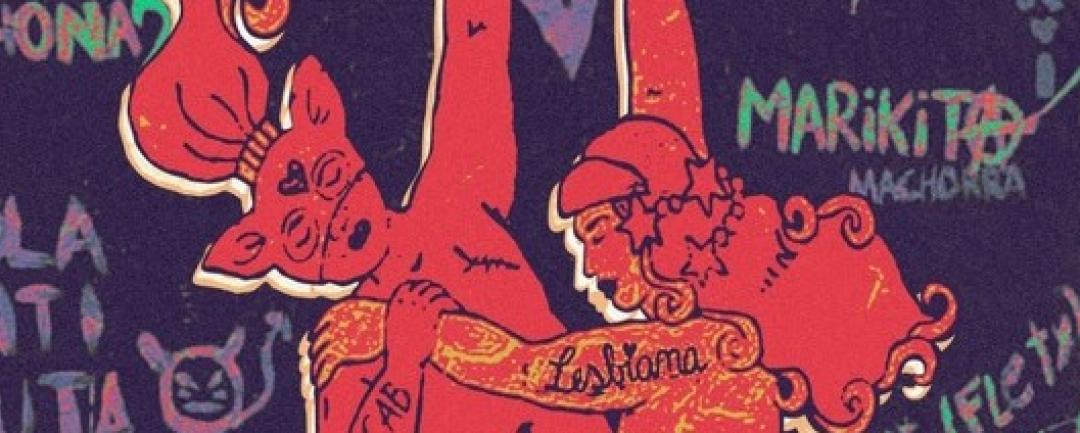
The report gives accounts of first-person accounts of situations of torture and political imprisonment carried out against sexual dissidence by the State, in the framework of the insurrection that began on October 18 in Chile.
In the early morning of October 22, 2019, Josué Maureira, 23, a medical student at the Catholic University, was arrested and transferred to the 51st Pedro Aguirre Cerda Police Station. In that place he was tortured and raped by police officers.
“In the presence of 10 other policemen who were right there, they immediately began to hit me on the head and that's when they forced me to scream. They tell me but accept it and they start hitting me on the head until I say "yes, I'm a fagot." That forced me to scream, "said Josué.
It was the first days of the insurrection and Josué's testimony began to circulate on social networks, confirming the concerns of Toli Hernández and her colleagues from the Las3 Abisales lesbofeminist collective.
“We knew that in moments of crisis there will always be some groups that will be the most affected. Among these groups were migrants, indigenous people and women. Josué's case made it necessary to systematize the information we were receiving through different sources,” he says.
From that moment on, a group of autonomous and anti-colonial feminist lesbians began to contact different people, organizations and activists to tell them of the intention to make a report and gather information about it. "From there we connect directly with the affected people and we begin to collect their testimonies and provide them with legal and emotional support," explains Toli.
Thus, in November 2010, a First Report was published, which allowed for strengthening with organizations of sexual dissidence and with other instances that were not necessarily sexual dissidents.
This week the Second Report was published, which includes data and testimonies from October 19, 2019 to March 11, 2020. The Lesbian Group Breaking the Silence, the Feminist Coordinator of Punta Arenas, Autonomous Feminists, Las3 AbisaLes participated in its preparation. , Organizing Trans Diversities - OTD, Organized Movement of Gays, Lesbians, Trans and Heterosexuals - MOGALETH, and La Zarzamora. Antispecist Feminist Creation and Diffusion Collective.
Memory Construction
The Report, which had the support of an Activist Fund, also arose as a need to generate a record for memory.
"It was important to systematize this information because we had the experience of the Dictatorship and this was a dictatorship for us because it operated with very similar mechanisms of action, in terms of the violence that could be verified in a short period of time," says Toli.
Talking about sexual dissidents in this sense was fundamental: “During the dictatorship, all the reparation and justice reports never included these differences: neither to sexual dissidents, nor to other communities. For us it was necessary to account for this because although there is violence that was transversal, there were differences with specific characteristics that should be considered in terms of future reparation and justice processes.”
systematic violence
The content of the report was forceful and gave an account of what organizations such as Amnesty International and Human Rights Watch had already pointed out and that had been denied by the Government of Sebastián Piñera.
Among these reports and the report made by the compañeras, it was possible to find at least four coincidences that allow characterizing the political violence during the insurrection: constant repression that violates Human Rights and makes indiscriminate and improper use of firearms as deterrence mechanisms; broad powers of arrest; violence without judicial sanctions; and mistreatment, sexual violence and torture.
«If this is combined with fundamentalism, we are talking about a system that is colonial, patriarchal and capitalist and that is going to organize imaginaries and representations in a way so that these situations become natural. Making this type of violence visible also points to the fact that there is no naturalization regarding the differences that we can find in this type of violence.
The particularity of sexual violence against all dissidents
Although it is true that torture and political-sexual violence affect all bodies, there are particularities that make it necessary to be able to identify them because their approach and social implications are different.
“We were able to observe that squats and stripping were a particular type of political violence and that it affected women. However, in the cases we reported, several of the gay men were forced to strip and do squats. In addition, in all the cases that can be observed in the report, there was none in which names and scribbles with the specificity of sexual dissidence were not involved, with the aim of inferiorizing them and framing these attacks as hate crimes ”, explains the activist.
In this order of things, he opted to connect sexual dissent within the framework of struggles that are broader and to recognize them intertwined with class, race and sexuality. “The idea is to bet from there on a critique of the universality of political subjects. Because being a woman is not the same as being a lesbian; nor being a middle-class lesbian, than being a poor lesbian.”
Within the framework of hate crimes, this allowed them to think about the articulations of all these communities, to reflect on these differences and generate proposals that are “transformative to illuminate the limits of the insurrection itself. The meaning is how we diversify an imaginary, how we understand that we all have the same possibilities of being and being on the planet in the ways we want”.
Finally, Toli Hernández explained that it is urgent to look at activism from these intersections, because if not, certain protagonisms will always rise in the way in which violence is addressed and these have to be differentiated.
“Understanding this only from the perspective of sexual dissidence as something isolated weakens the counter-hegemonic force that we could represent, because in the end we are focused on winning our own battles and not a battle that articulates a great battle against this great system that is the dominant order”, he reflected.







